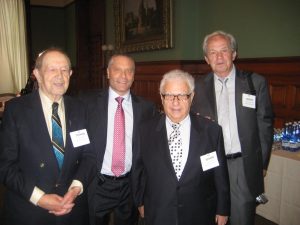Nate Leipciger has this audience in the palms of his hands.
It’s evident the 87-year-old Holocaust survivor has told his story many times before, as he walks leisurely in front of more than 200 people assembled for the opening event of Holocaust Education Week in Halifax.
He speaks emotionally, carefully and in fluent clear English about his experience as a young Polish teen living through almost two years of horror under the Nazis during World War II.
“You could only hang onto hope,” he said to a Nov. 1 audience of Jews and non-Jews. “It was the only survival mechanism.”
He stressed the importance of telling his story, which he has done in book form. The Weight of Freedom is a 280-page tome, one of 62 in the Azrieli Series of Holocaust Memoirs of Canadian survivors.
“It’s important to tell the story. There are six million stories and we [the survivors] have to talk for them,” he said.
Leipciger – who was in Halifax with his wife, three daughters, their spouses and two of his nine grandchildren – headlined a week of education that drew large numbers to two films, a French presentation, and a talk by guest lecturer Rabbi Claudio Kasier-Blueth, retired from a pulpit in Victoria B.C., discussing reconciliation between church and synagogue.
The week concluded Nov. 8 with a commemoration of Kristallnacht, when Holocaust survivor Sidney Zoltak of Montreal, a Polish boy saved by Christians in his hometown, was guest speaker.
In his Nov. 1 talk, Leipciger told how, as a 15-year-old in 1943, he was taken with his family from their quiet home in Chorzow, Poland, put on a cattle car and delivered “to the middle of nowhere. I was tattooed [No. 133628], which meant I was going to a concentration camp. Those not tattooed were taken to the gas chambers at once.”
He and his father were spared. His mother and sister were taken away and never seen by Leipciger and his father again. Leipciger said he survived in Auschwitz and other camps until January 1945, when his camp was evacuated so its prisoners could go on a five-day, 140-km death march, with only a half a loaf of bread and no water. Many died en route.
By April, he said to his father, who had miraculously survived with him, “I can’t go on. I’d rather be shot right now than die at the roadside.” His father urged him forward. “You can’t give up hope now,” he said. Within three days, the Americans liberated them, “and we had a restoration of life.”
He eventually arrived in Canada, with his father and completed high school, learning English, with difficulty, so he could find a trade. He worked part-time jobs and graduated from the University of Toronto with an engineering degree.
After working for others, he and two partners started a firm that became very successful. Today, he’s retired, but his daughter, Lisa Pinkus, runs the firm, now a division of SNC Lavalin.
Leipciger is an annual leader of March of the Living tours and speaks often to schools and other groups about his Holocaust experiences. He and wife, Bernice, have been married for 61 years. “When he first told me his story, I didn’t believe him,” said Bernice, who was 17 at the time. “He suggested I read books he recommended to me, and I did. I understood very quickly.”
She says Nate would have nightmares, “but he wanted the world to know. It’s his mandate. He feels he has to do this.”
Zoltak, 83, came through Pier 21 in Halifax to Montreal in May 1948 and became a successful insurance broker. He spoke of his return to Poland in 1997 to thank the Catholic family who saved him and his family.
He wanted to present them with a Righteous Among Nations medal for protecting Jews during the war, but they refused, still afraid of anti-Semitic reprisals all those years later.
“Finally in 2011, they accepted it, but only before a very small gathering at the Israeli Embassy in Poland,” he said.
He said the world has learned little in the last 80 years. Governments don’t speak loudly enough, and children must be taught, by their parents that hate is never right and love is never wrong.






